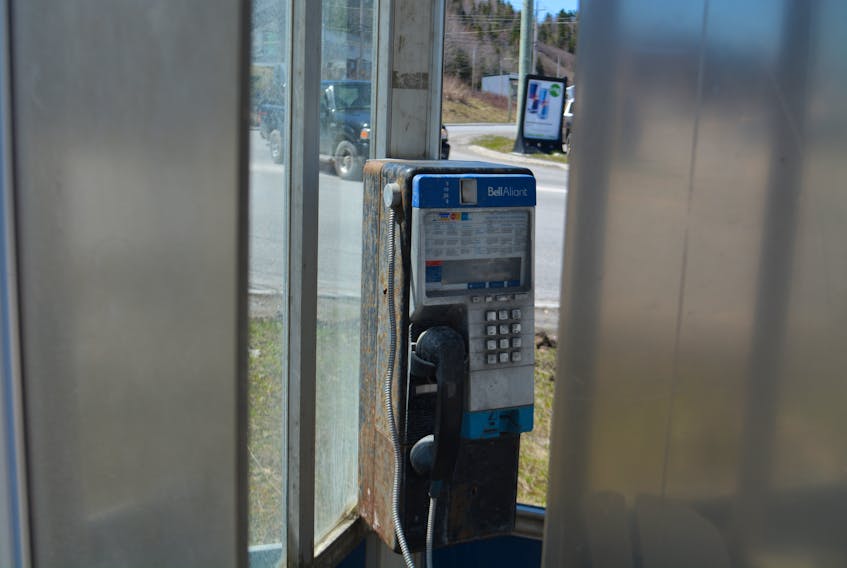The Bell Aliant payphone at the edge of Riverside Drive is showing its age.
Located at the crossroads of the north shore and south shore of the Bay of Islands, it has seen better days and doesn’t appear to have been used for some time.
The booth has missing windows and its colour has faded with time.
The phone itself is in relatively good shape, although spots of orange rust dot its visage. Layers of dust have collected on the receiver and its chord.
A loonie sits in the change bin as if its waiting for someone who needs to make a couple of calls
When you pick up the receiver, there is no dial tone to greet you. The only sign of life is the shrill of a beep that comes through the phone when you press numbers on the keypad.
The two, five, six and eight buttons stick when pressed before slowly returning to normal. They’re like a door that needs a lick of oil to loosen things up.
The penetrating sounds of the pushed buttons leads you to believe you connect with someone on the other end, but it’s just the ghost of a bygone era.
It’s just one of a number of payphones around the Corner Brook region.
Everyone has a cellular phone these days. Chances are if you asked a person younger than the age of 20, they might struggle with defining what a payphone is.
I’d imagine they’d liken it to a pre-paid cell or something their parents fork over the dough for.
They’ll never know the struggle of needing to call your parents, digging through your pockets and coming up empty in the search for a quarter.
After you rummage through every pocket on your person, you would’ve turned to your friends for help.
If you got nothing there, it was time to make a long-distance call, blurt your message into the space reserved for your name and pray to your chosen deity that the intended recipient is paying attention.
For folklore professor John Bodner, the advent of the cellular phones has robbed him of an urban legend for city folk.
Of course, each phone had a number that could be dialed. People would watch eagerly as someone walking the street would stop by the phone and then dial its number.
When the person answered, there was nobody there.
Of course, it’s different now. The little piece of folklore was made obsolete because of the device in our pockets.
“It’s almost like we’ve moved beyond payphones,” said the professor of folklore and Grenfell Campus in Corner Brook.
The cellphone came around slowly, especially in my neck of the woods, and when they did they weren’t the giant pieces of white plastic that Zack Morris carried around in “Saved By the Bell.”
They — at least in my family — were the big grey Motorola weapon where you had to pull the antenna out and flip a bottom compartment to dial anyone.
It starts with the upper class and filters its way through as the technology gets cheaper. Eventually, as we see it today, mostly everybody has instant communication through phone calls, text messages, emails, direct messages, etc.
Immediately, a cellphone became a symbol of status. If you were poor you had no choice but to rely on the payphone to conduct business when outside the home.
It is still the case in some places.
“People become stigmatized because they don’t have (a cellular phone),” said Bodner. “The very poor don’t have cell phones. Communication is denied to them.
“Having a phone in your pocket changes social roles.”
Bodner grew up in rural Ontario. His home and the three others around him all shared the one phone line, but each had different ringtone.
Dubbed the party line, every time Bodner would pick up the phone there was a chance someone might be on the line from another home.
That lack of privacy is gone now. You can’t listen in on your older sister or eavesdrop on one of your buddies.
Growing up, if you dialed your friend’s house and he wasn’t home there wasn’t a direct line of communication where you could get him after the fact.
You just moved on to a different friend.
Cellphones change the game, so to speak.
Communication developed new rules and the payphone just couldn’t adapt.









